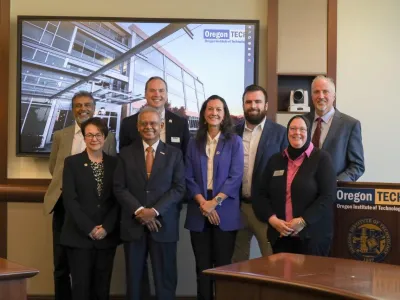By
Email the author | Follow on Twitter
on April 28, 2013 at 4:50 PM, updated April 28, 2013 at 9:19 PM
The Oregon Institute of Technology's newest specialty program in Wilsonville aims to fill an emerging knowledge gap in Oregon and across the country.
Optoelectronics is the fusion of optics -- the study of light -- and electronics, and its applications in a number of high-tech industries are growing.
More than 90 Oregon companies now hire engineers to incorporate lasers, camera lenses, LEDs and other optical devices into products ranging from consumer electronics to military technology, according to Cristina Crespo, the chair of Oregon Tech's renewable energy and electrical engineering department.
Two such companies are located next door to the Wilsonville campus: Flir, which specializes in infrared technology, and Rockwell Collins, an aviation electronics company.
In all, about 230 students in the U.S. graduate with the necessary skills, even though more than 1,200 are needed each year, according to the university. In Oregon, these companies often must recruit engineers from out of state, Crespo said.
"It's been a continually underserved knowledge area," said Scott Prahl, optoelectronics program director.
Last fall, as Oregon Tech consolidated its four Portland-area sites into the former InFocus building in Wilsonville, Prahl sought to resurrect the optics program the university discontinued about a decade ago at its Klamath Falls campus.
Prahl, a former researcher at the now-defunct Oregon Medical Laser Center, spent three months developing a curriculum and putting together a new laboratory space complete with special work tables supported by compressed air that keep sensitive equipment stable during experiments.
In the past, it was very expensive to teach optics, Prahl said. But now the equipment is much cheaper. "You can get a laser pointer for $10, when it used to cost $1,000," he said.
For students pursuing an electrical engineering degree, Prahl said his six-class program provides a hands-on introduction to light detectors, lenses, lasers, fiber optics and wave interference -- the bare essentials for students looking to get a job in the field.
"When you land a job and they say you need to know what chromatic aberration is, you will actually know," Prahl said.
The University of Oregon and Oregon State offer some instruction in the optics, but not to the extent of Oregon Tech's program, Prahl said.
For neighboring Flir and Rockwell Collins, as well as nearby laser supplier Coherent Inc., the new program offers a chance for Wilsonville companies to collaborate with the university and find interns and employees, Prahl said.
"I'm impressed with the program," said Terry Outcalt, Flir's general manager. "A lot of people coming out of college are used to digital, but optics is still kind of an analog world that needs specialized training."
Prahl taught five students last quarter and is currently teaching another group of five. He hopes that number will increase going forward.
"Because the program is so new, those students didn't come here with the program in mind," he said. "But the sessions we've had were just great."
--Michael Bamesberger









